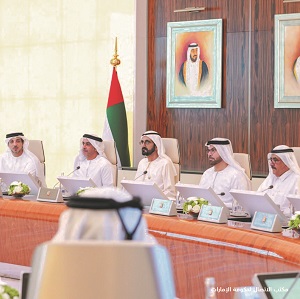Media Center
UAE cabinet adopts 10 strategic resolutions
The UAE Cabinet adopted 10 strategic resolutions to support Emiratization on Sunday during a meeting chaired by His Highness Sheikh Mohammed bin Rashid Al Maktoum, Vice President and Prime Minister of UAE and Ruler of Dubai, at the Presidential Palace in Abu Dhabi. The new resolutions are part of the outcomes of the committee, chaired by His Highness Sheikh Mansour bin Zayed Al Nahyan, Deputy Prime Minister and Minister of Presidential Affairs, to implement the “Letter of the new season”.
Sheikh Mohammed bin Rashid Al Maktoum has earlier issued the “Letter of the new season” to reinforce the country’s economic and community performance in all sectors. The resolutions were issued in the cabinet meeting attended by His Highness Lt. General Sheikh Saif bin Zayed, Deputy Prime Minister and Minister of Interior and Sheikh Mansour bin Zayed Al Nahyan.
Sheikh Mohammed bin Rashid Al Maktoum reaffirmed that “The UAE will keep attracting global talents, the key driving force to our economy.
We will support the private sector to achieve balance in our job market and our fast-growing economy will keep providing millions of opportunities for Emiratis and residents.”
He added, “Human capital is the fuel of nations. Uniting efforts of our national cadres and foreign talents will accelerate our journey towards the future.”
During the meeting, the cabinet also approved the amendment of the Federal Bankruptcy Law and approved hosting the World Conference on Creative Economy as part of Expo 2020 Dubai.
Regulating Emiratization The 10 resolutions that support Emiratization in ministries, federal entities, federal and local government and semi-government organizations among other economic sectors include:
1- Issuing regulations and setting new targets to provide 20,000 job opportunities for Emiratis in strategic sectors including civil aviation, telecommunications, banking, insurance and real estate development sectors over the next three years, with an average of 6,700 jobs annually.
Following an extensive plan, Emirati employees shall be integrated in positions that meet their skills and expertise in vital sectors.
2- Allocating a Dh300 million fund to create specialized training programmes that prepare and empower Emirati jobseekers with theoretical and applied skills to enhance performance in all sectors. The programmes will contribute to nurturing necessary skills and empowering Emiratis to offer an added value to the private sector, which plays an integral role in the country’s development.
Training national cadres
3- Adopting a new system to train 8,000 Emiratis graduates annually in government, semi-government and private entities for 6-12 months with a Dh10,000 salary, 40% of which will be covered by the government.
4- Launching specialized diplomas across Higher Colleges of Technology in the UAE to prepare and train Emiratis for the workplace.
Training programmes will be designed to build and develop 18,000 national cadres over the next three years.
5- Allocating a portion of the VAT revenues, on the federal and local level, to creating graduate development programmes that empower and build new skills.
6- Opening up job opportunities for Emiratis in administrative and supervisory roles across ministries and federal entities, ensuring the selection of suitable candidates with the necessary skills and capabilities to fulfil their roles.
7- Amending the labor and pension laws to equalize benefits for Emirati employees in the government, semi-government and private sectors.
The amendment will unify the mechanism in calculating pensions, benefits and previous service additions in government and private sector to encourage Emirati employees to expand their career options in the private sector to gain new skills.
8- Forming a committee in the Ministry of Human Resources and Emiratization, Federal Authority for Government Human Resources, Federal Authority for Identity and Citizenship, General Pension and Social Security Authority and Abu Dhabi Retirement Pensions and Benefits Fund to develop mechanisms that encourage and monitor national employment across UAE companies.
Emiratization Index
9- Entities and companies in the strategic sectors with low number of Emirati employees will be encouraged to support national skill development programmes. 10- Setting an annual index to measure Emiratization across all sectors.
The government will provide exceptional incentives to entities that facilitate job opportunities for nationals. The cabinet shall hold an annual ceremony to reward CEOs and entrepreneurs who support Emiratization.
The cabinet has assigned the Ministry of Human Resources and Emiratization to implement the 10 resolutions, in coordination with the executive councils.
The cabinet will receive quarterly reports to follow up the progress. Other resolutions The cabinet also approved the amendment of the
Federal Law by Decree No. (9) of 2016 on Bankruptcy to restructure financial regulations related to bankruptcy. The cabinet also approved the amendment of Federal Law No. 20 of 2016 Concerning mortgaging of movable properties as security for debts to enhance government competitiveness on a global scale, attract more investments in the country and support economy across different sectors.
The cabinet also approved hosting the World Conference on Creative Economy as part of Expo 2020 Dubai. The conference is expected to attract local and global entities, private sector, entrepreneurs, authors and scholars to discuss ways to improve creative economy.
Additionally, the cabinet adopted “the procedural guide to the recommendations of the Federal National Council” that identifies the roles and responsibilities of the Ministry of State for Federal National Council Affairs and other relevant entities.
The cabinet also approved the reformation of Committee for Goods and Materials Subjected to Import and Export and the Board of Directors of Emirates Transport.
The Board approved the 2018 closing account of Emirates General Petroleum Corporation (Emarat), and the closing account of Al Etihad Credit Bureau and the General Secretariat of the Cabinet.
On the international affairs level, the cabinet adopted a number of agreements including a UAE-Zimbabwe agreement to encourage and protect mutual investments. Another agreement aims to prevent tax duplication and evasion.
The UAE government also signed an economic cooperation agreement with Kenya.


